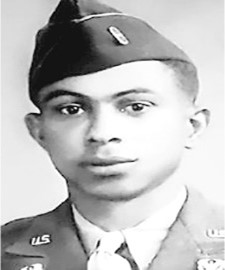OQMC - Regimental Office - 2023 Inductees - WO Johnnie A. Jones Sr.
2023 Quartermaster Corps
Hall of Fame Inductee

Warrant Officer
Johnnie A. Jones Sr.
Special Historical Hall of Fame Inductee
Mr. Jones continued to serve fighting in the Northern France campaign on the western front at the Battle of the Bulge. He was among more than 2,000 African-Americans troops that participated in the Normandy Invasion and subsequent campaigns. By the end of World War II, more than a million African Americans were in uniform including the famed Tuskegee Airmen and the 761st Tank Battalion.
Upon his return to the United States, he resumed his studies and changed his major to psychology, receiving a Bachelor’s degree in 1949 and in 1953 he received his Law degree from Southern University. Mr. Jones served briefly in the Louisiana House of Representatives in the 1970s. When Mr. Jones returned home to Louisiana, he was greeted not with a hero’s welcome, but rather with all the indignities of segregation in the Jim Crow South.
Mr. Jones enrolled in law school and became a lawyer in the early years of the civil rights movement. He was recruited in 1953 to help organize a bus boycott in Baton Rouge and defend the participants. The Reverend Dr. Martin Luther King used that event to plan his larger bus boycott in Montgomery, Alabama, several years later. Mr. Jones also defended students arrested during sit-ins as civil rights protests gained momentum in the South resulting in his car was bombed twice. The boycott ended with the partial desegregation of city buses, with the front two rows of seats reserved for White people and the last two rows for Black people. While some protesters had hoped for a more dramatic outcome, historians today describe the Baton Rouge boycott as a prototype of others to come.
The Rev. Martin Luther King Jr. consulted with organizers in Baton Rouge before organizing the Montgomery boycott, which lasted 382 days and ended with a Supreme Court ruling desegregating the Montgomery transit system. Mr. Jones was credited with fighting legal battles on multiple fronts of the movement for racial equality. “Almost unnoticed at the time,” the Baton Rouge protest “was a direct precursor of the Montgomery bus boycott,” Fairclough wrote, “and an event of major significance in the evolution of the civil rights movement.” He worked with voter leagues and with civil rights organizations, including the NAACP and the Congress of Racial Equality. He assisted demonstrators who participated in lunch-counter sit-ins.
Mr. Jones continued practicing law well into his 90s. During his service in World War II, Mr. Jones sustained shrapnel wounds that he would bear for the rest of his life. “The doctor told me it would really hurt in 75 years, but I wouldn’t have to worry about that,” he said. “I fooled him. It hurts, and I’m still picking it out of my head and arm.” He waited for his service to be recognized with a Purple Heart, receiving the Award some 77-years later. The long delay was symbolic of what he saw as the slow move toward justice in the civil rights movement. “It’s going to take a while,” Mr. Jones said. “You just need to be willing to take a stand.”
